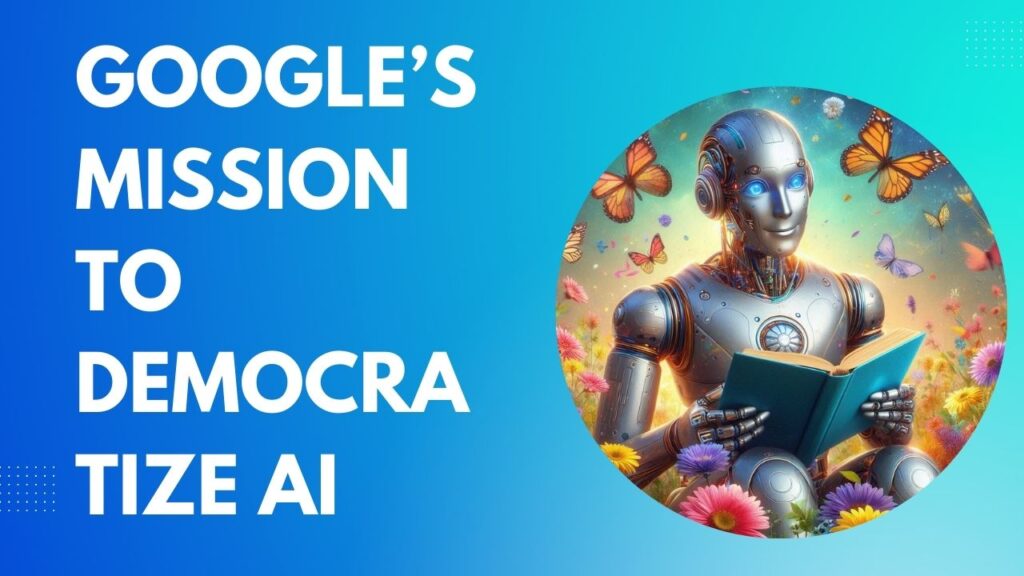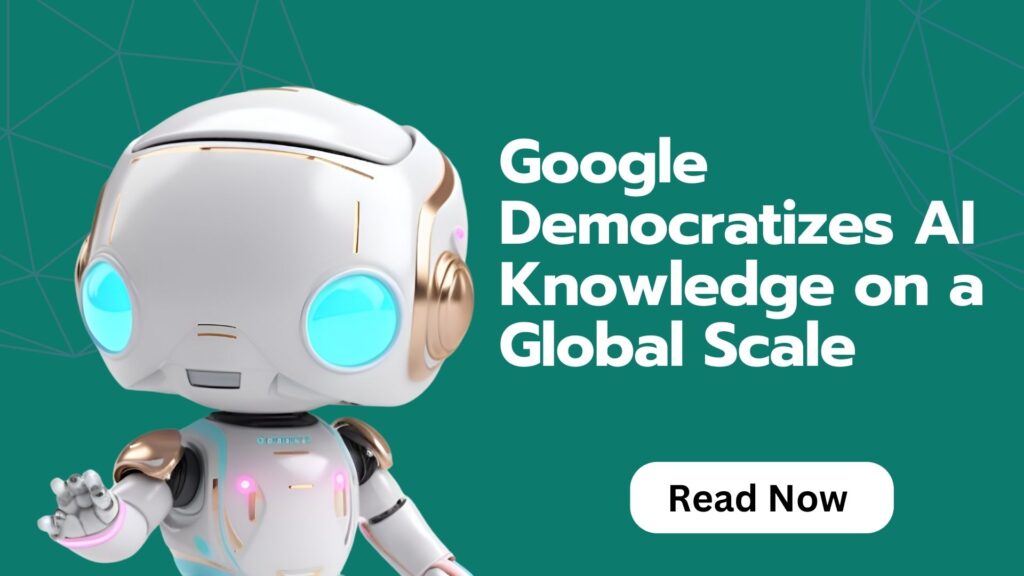Artificial Intelligence (AI) has rapidly evolved from a futuristic concept to an integral part of modern technology. With its applications spanning from healthcare to education, AI has the potential to solve some of the world’s most pressing challenges. However, for AI to reach its full potential, it needs to be accessible to everyone, not just a select few. This is where Google’s mission to democratize AI knowledge comes into play.
Table of Contents
Google’s Mission to Democratize AI

Google has long been at the forefront of AI research and development. Understanding the transformative power of AI, Google is committed to making this technology accessible to individuals and organizations around the globe. By democratizing AI knowledge, Google aims to empower people with the tools and education needed to innovate and apply AI in diverse fields.
The importance of this mission cannot be overstated. As AI becomes more integrated into various industries, the need for widespread understanding and application of AI grows. Google’s initiatives ensure that AI knowledge is not limited to a few experts but is available to anyone with the curiosity and drive to learn.
The Importance of Democratizing AI Knowledge
The democratization of AI knowledge is a critical step toward fostering global innovation. When more people have access to AI tools and education, the potential for creative problem-solving increases. This is particularly important as AI can be applied to address significant global challenges, such as improving healthcare outcomes, advancing climate change solutions, and fostering economic development.
Furthermore, democratizing AI knowledge helps create a more equitable technology landscape. Historically, cutting-edge technologies have been confined to a limited group of individuals or organizations, often in developed regions. By making AI knowledge more accessible, Google is leveling the playing field, allowing innovators from all backgrounds and locations to contribute to the AI revolution.
Key Google Initiatives to Spread AI Knowledge
Google has implemented several key initiatives to make AI knowledge widely accessible. These efforts range from offering online courses and certifications to providing open-source AI tools and research publications. Let’s explore some of these initiatives in more detail.
Google AI for Everyone: Online Courses and Certifications
One of Google’s most significant contributions to AI education is its array of online courses and certifications. These courses are designed to cater to learners at all levels, from beginners to seasoned professionals. For instance, the “AI for Everyone” course introduces the fundamentals of AI in an easy-to-understand manner, making it an excellent starting point for those new to the field. Meanwhile, the “Machine Learning Crash Course” provides more in-depth knowledge for those looking to delve deeper into the technical aspects of AI.
These courses are not only free but also accessible globally, ensuring that anyone with an internet connection can benefit from them. By offering certifications, Google also allows learners to showcase their newly acquired skills, which can be a significant asset in today’s job market.
Google’s AI Research Publications and Open-Source Projects
Google contributes to the AI community by sharing its research publications and open-source projects. Google’s AI research is often at the cutting edge, and by making these findings publicly available, the company allows others to build on its work.
One of the most notable open-source projects from Google is TensorFlow, an AI framework that has become a cornerstone for many developers and researchers worldwide. TensorFlow’s flexibility and scalability make it suitable for a wide range of AI applications, from simple models to complex neural networks. By open-sourcing TensorFlow, Google has provided a powerful tool that can be used by anyone to develop and deploy AI models.
AI-Powered Tools and Platforms Available to the Public
Google has also developed several AI-powered tools and platforms that are available to the public. These tools are designed to make AI development more accessible, even for those without extensive technical expertise. Google Colab, for instance, is a cloud-based platform that allows users to write and execute Python code in a web-based environment. It’s particularly popular among data scientists and AI researchers because it provides a free, easy-to-use platform for developing and testing AI models.
Another powerful tool is AutoML, which enables users to build machine learning models without having to write extensive code. AutoML automates many of the complex tasks involved in model development, such as hyperparameter tuning and model selection. This makes it easier for individuals and organizations to harness the power of AI, even if they don’t have a team of data scientists.
Vertex AI is another platform that simplifies the deployment of machine learning models. It provides a unified interface for managing all aspects of the machine learning lifecycle, from data preparation to model training and deployment. By streamlining these processes, Vertex AI allows developers to focus on creating impactful AI solutions rather than getting bogged down by the technical details.
Impact of Google’s AI Democratization on Different Sectors
The impact of Google’s efforts to democratize AI knowledge is already being felt across various sectors. By providing accessible AI tools and education, Google is helping to drive innovation in industries such as healthcare, education, and business.
AI in Healthcare
In healthcare, AI has the potential to revolutionize how diseases are diagnosed and treated. Google’s AI tools are being used to develop models that can analyze medical images, predict patient outcomes, and even personalize treatment plans. By making these tools accessible to a broader audience, Google is enabling healthcare professionals and researchers to leverage AI in ways that improve patient care and outcomes.
AI in Education
The education sector is also benefiting from Google’s AI democratization efforts. AI-driven educational tools, such as Google Classroom and Socratic, are making learning more personalized and accessible. These tools can help educators identify students’ strengths and weaknesses, providing tailored support to enhance learning outcomes. Additionally, by integrating AI into educational platforms, Google is helping to prepare the next generation of learners for a future where AI plays an increasingly important role.
AI in Business and Startups
For businesses and startups, Google’s AI tools offer a way to innovate without the need for extensive resources. Small businesses, in particular, can benefit from tools like AutoML, which allow them to develop AI models that can optimize operations, enhance customer experiences, and drive growth. By democratizing access to AI, Google is enabling more businesses to compete on a level playing field, regardless of their size or location.
Global Reach: AI Knowledge for Emerging Markets
One of the most significant aspects of Google’s AI democratization efforts is its focus on reaching emerging markets. In many developing regions, access to advanced technology has historically been limited. However, by providing free AI courses, tools, and resources, Google is helping to bridge this gap.
Emerging markets stand to benefit greatly from increased access to AI knowledge. In these regions, AI can be a catalyst for economic growth and development. For instance, AI-powered solutions can help improve agricultural productivity, optimize supply chains, and enhance public services. By making AI knowledge accessible in these regions, Google is not only empowering individuals but also contributing to broader economic development.
Challenges and Future Prospects in AI Democratization
While Google’s efforts to democratize AI are commendable, there are still challenges to be addressed. One of the primary challenges is ensuring that AI knowledge is accessible to non-English speakers. Although many of Google’s resources are available in multiple languages, there is still work to be done to make AI education truly global.
Another challenge is the digital divide, which affects many emerging markets. Limited access to the internet and technology infrastructure can hinder the ability of individuals in these regions to take full advantage of AI resources. Google’s initiatives to expand internet access, such as Project Loon and Google Station, are steps in the right direction, but more needs to be done to ensure that everyone can benefit from AI democratization.
Looking ahead, the future of AI democratization holds great promise. As AI technology continues to evolve, the tools and resources available to the public will likely become even more sophisticated. Google’s ongoing commitment to making AI knowledge accessible will play a crucial role in ensuring that this technology can be used to address global challenges and drive innovation worldwide.
Conclusion
Google’s mission to democratize AI knowledge on a global scale is a significant step toward making AI accessible to everyone. By offering free courses, open-source tools, and AI-powered platforms, Google is empowering individuals and organizations to leverage AI for innovation and problem-solving.
The impact of these efforts is already being seen across various sectors, from healthcare to education to business. As Google continues to expand its AI democratization initiatives, the potential for global innovation will only grow. In the coming years, we can expect to see even more advancements in AI education and accessibility, driving progress and development in regions around the world.
Google’s vision for AI democratization is not just about making technology available; it’s about ensuring that everyone has the opportunity to learn, innovate, and contribute to the AI revolution. As AI becomes an increasingly integral part of our world, Google’s efforts will play a crucial role in shaping a future where AI is a tool for all, not just a select few.
If you’re interested in exploring the world of AI, there’s no better time to start than now. Google offers a wealth of free resources, including online courses, open-source tools, and research publications. Whether you’re a beginner looking to understand the basics or an experienced professional aiming to deepen your knowledge, Google has something for you.
Visit Google’s AI education platforms, explore their open-source projects, and start your journey into the world of AI today. By taking advantage of these resources, you’ll not only be enhancing your own skills but also contributing to the global democratization of AI knowledge.


